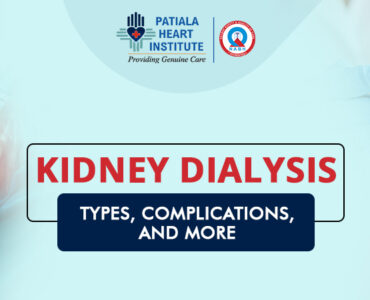Kidney health is essential for the overall functioning of the human body. The kidneys are vital in filtering waste products, excess fluids, and toxins from the blood, maintaining electrolyte balance, and regulating blood pressure. However, when the kidneys are not functioning optimally, it can lead to elevated blood urea nitrogen (BUN) and creatinine levels two key indicators of kidney function.
High BUN and creatinine levels often signal that the kidneys are struggling to remove waste products effectively. This can be due to various underlying causes, such as dehydration, kidney disease, or other medical conditions. Managing these elevated levels is crucial for preventing further kidney damage and maintaining overall health.
This comprehensive guide will help you understand BUN and creatinine, the causes of their elevated levels, and effective strategies for managing and maintaining kidney health. We’ll also discuss the importance of consulting a kidney care doctor and the options available for those seeking expert treatment, including the services offered by Patiala Heart Institute.
Understanding BUN and Creatinine
What is BUN?
Blood Urea Nitrogen (BUN) measures the amount of nitrogen in your blood from the waste product urea. Urea is produced when the liver breaks down proteins in your food. Usually, your kidneys remove urea from your blood, so BUN levels can indicate how well your kidneys function.
What is Creatinine?
Creatinine is a waste product formed by the normal breakdown of muscle tissue. It is produced at a relatively constant rate and is removed from the body by the kidneys. High levels of creatinine in the blood can indicate impaired kidney function or kidney disease.
Why Are BUN and Creatinine Levels Important?
Both BUN and creatinine are used as key markers to assess kidney function. Elevated levels of these substances in the blood can suggest that the kidneys are not working efficiently to filter and eliminate waste. Monitoring these levels is crucial for diagnosing and managing kidney-related issues.
Causes of High BUN and Creatinine Levels
Understanding the BUN and creatinine high levels is the first step toward managing and treating elevated levels effectively. Several factors can contribute to elevated BUN and creatinine levels, including:
1. Dehydration
Dehydration reduces blood flow to the kidneys, leading to a concentration of waste products in the blood. This can raise BUN and creatinine levels.
2. Kidney Disease
Chronic kidney disease (CKD) or acute kidney injury (AKI) can impair the kidneys’ ability to filter waste, resulting in elevated BUN and creatinine levels.
3. High Protein Diet
Consuming a protein-rich diet can increase urea production, leading to higher BUN levels.
4. Medications
Certain medications, such as nonsteroidal anti-inflammatory drugs (NSAIDs), ACE inhibitors, and diuretics, can affect kidney function and elevate BUN and creatinine levels.
5. Heart Conditions
Heart failure and other cardiovascular conditions can reduce blood flow to the kidneys, leading to decreased kidney function and higher waste product levels.
6. Obstruction of Urinary Tract
Conditions such as kidney stones or an enlarged prostate can obstruct urine flow, causing waste products to accumulate in the blood.
Managing Elevated BUN and Creatinine Levels
Effective management of elevated BUN and creatinine levels involves addressing the underlying causes and adopting strategies that support kidney health. Here are some essential tips to help you manage and maintain optimal kidney function:
1. Stay Hydrated
Proper hydration is crucial for kidney function. Drinking adequate water helps dilute the concentration of waste products in the blood and supports the kidneys’ filtration process. Aim for at least 8-10 glasses of water per day, but consult your kidney doctor specialist in Patiala for personalized advice, especially if you have an existing kidney condition.
2. Adopt a Kidney-Friendly Diet
Diet plays a significant role in managing kidney health. A kidney-friendly diet typically includes:
- Reduced Sodium Intake: High sodium levels can increase blood pressure and strain the kidneys. Aim to limit your sodium intake to less than 2,300 mg per day.
- Moderate Protein Consumption: While protein is essential for overall health, excessive intake can increase urea levels. Focus on moderate, high-quality protein sources such as lean meats, fish, and eggs.
- Limit Potassium and Phosphorus: To prevent further complications, those with kidney issues must monitor and limit foods high in potassium (e.g., bananas, oranges) and phosphorus (e.g., dairy nuts).
- Increase Fiber Intake: A diet high in fiber from fruits, vegetables, and whole grains can help reduce urea and creatinine levels.
3. Manage Blood Pressure
High blood pressure is a leading cause of kidney damage. Regular monitoring and management of blood pressure through diet, exercise, and medication are essential for protecting kidney function.
4. Monitor Blood Sugar Levels
For individuals with diabetes, controlling blood sugar levels is crucial in preventing kidney damage. High blood sugar can damage blood vessels in the kidneys, leading to elevated BUN and creatinine levels.
5. Exercise Regularly
Regular physical activity can help improve overall health and kidney function. Exercise helps control blood pressure, manage weight, and reduce the risk of chronic conditions affecting kidney health. Aim for at least 30 minutes of moderate exercise most days of the week.
6. Avoid NSAIDs and Other Harmful Medications
Nonsteroidal anti-inflammatory drugs (NSAIDs) and certain other medications can harm kidney function, mainly if used long-term or in high doses. Consult your kidney care doctor before taking any medicines affecting your kidneys.
7. Consider Medical Treatments
In cases where lifestyle changes are not sufficient, medical interventions may be necessary to manage elevated BUN and creatinine levels. High urea and creatinine treatment options may include:
- Dialysis: For severe kidney impairment, dialysis may be required to filter waste products from the blood.
- Medications: Certain medications can help reduce protein levels in the urine, lower blood pressure, and manage underlying conditions contributing to kidney damage.
- Surgical Interventions: In cases of urinary tract obstruction or other structural issues, surgery may be necessary to restore normal kidney function.
8. Regular Monitoring
Regular blood tests to monitor BUN and creatinine levels are essential for managing kidney health. Early detection of elevated levels allows for timely intervention and prevents further kidney damage.
9. Consult a Kidney Specialist
If you have elevated BUN and creatinine levels, seeking expert advice from a kidney doctor specialist in Patiala is crucial. A specialist can provide a comprehensive evaluation, diagnose the underlying cause, and develop a personalized treatment plan to manage your condition effectively.
Prevention Tips for Maintaining Kidney Health
Preventing kidney damage before it occurs is the best approach to maintaining long-term kidney health. Here are some preventive measures to consider:
1. Regular Health Check-Ups
Routine health check-ups, including blood pressure and blood sugar monitoring, can help detect potential issues before they become serious. Regular kidney function tests can also catch early signs of kidney impairment.
2. Quit Smoking
Smoking damages blood vessels and reduces blood flow to the kidneys. Quitting smoking can significantly improve kidney function and overall health.
3. Limit Alcohol Consumption
Excessive alcohol intake can cause dehydration and increase blood pressure, both of which strain the kidneys. Moderation is vital to protecting your kidneys.
4. Maintain a Healthy Weight
Being overweight or obese increases the risk of conditions that can harm the kidneys, such as diabetes and hypertension. A healthy diet and regular exercise can help maintain a healthy weight.
5. Be Cautious with Over-the-Counter Medications
Over-the-counter medications, particularly NSAIDs, can harm kidney function when used excessively. Always consult your doctor before taking any medication, especially if you have pre-existing kidney conditions.
High Urea and Creatinine Treatment: What to Expect
When BUN and creatinine levels are elevated, prompt treatment is necessary to prevent further kidney damage. High urea and creatinine treatment may involve lifestyle modifications, medication, or more intensive medical interventions such as dialysis.
At Patiala Heart Institute, our multidisciplinary team, including nephrologists and kidney care doctors, work together to develop individualized treatment plans tailored to each patient’s specific needs. We focus on managing the underlying causes of elevated levels, such as hypertension or diabetes, while providing comprehensive support to help patients maintain optimal kidney health.
Our approach to treatment includes regular monitoring, patient education, and the use of advanced medical technologies to ensure the best possible outcomes. We believe in empowering our patients with the knowledge and tools they need to take control of their health and live their best lives.
Prioritize Your Kidney Health at Patiala Heart Institute
Managing elevated BUN and creatinine levels is crucial for maintaining kidney health and preventing long-term complications. Whether you’re dealing with high BUN and creatinine due to an existing condition or looking to avoid issues of kidney, taking proactive steps is essential.
At Patiala Heart Institute, our team of kidney care doctors and specialists is dedicated to providing our patients with the highest level of care. We offer comprehensive treatment options, including high urea and creatinine treatment, tailored to meet your needs.
If you’re concerned about your kidney function or have been diagnosed with elevated BUN and creatinine levels, don’t wait to seek expert care. Schedule a consultation with a kidney doctor specialist in Patiala today and take the first step towards protecting your kidney health and overall well-being.






![Chronic Kidney Disease [CKD]](https://patialaheart.com/blog/wp-content/uploads/2021/07/Impact-of-Covid-19-on-Chronic-Kidney-Disease-370x300.jpg)
